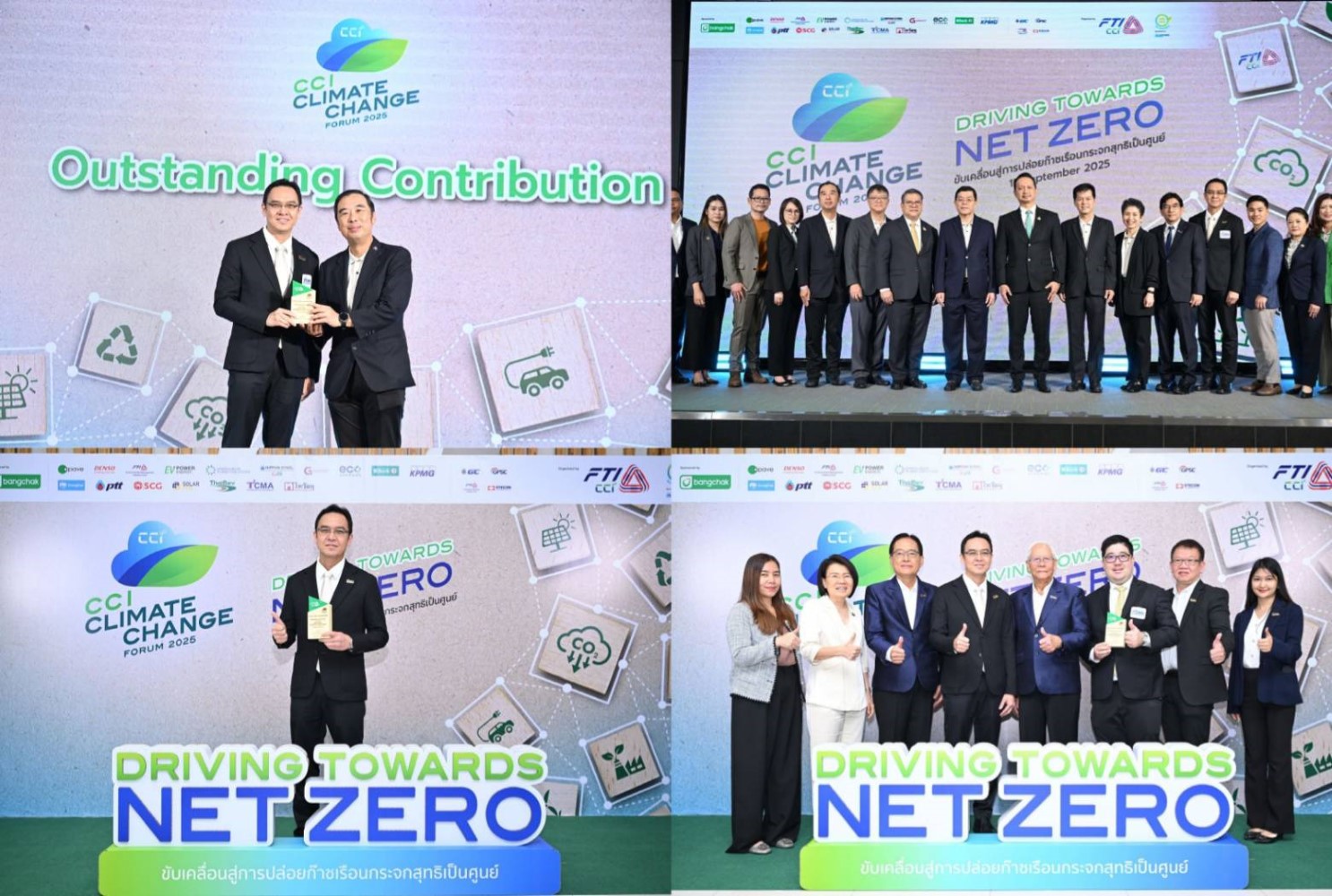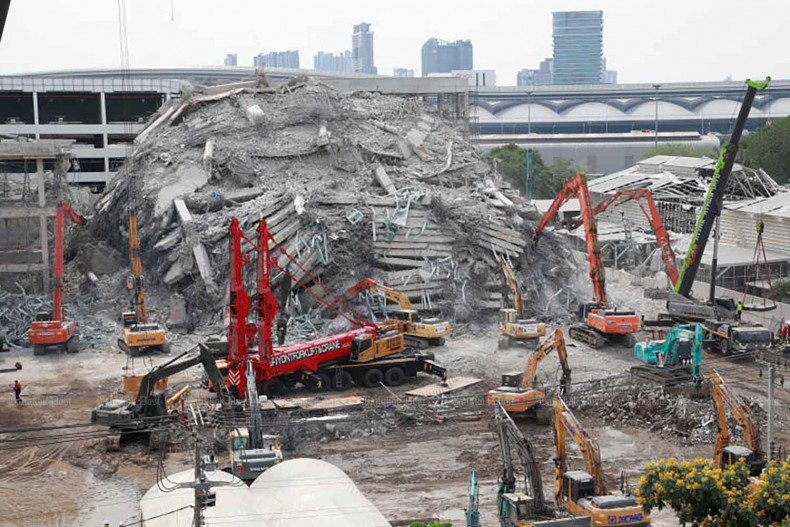The Thai Cement Manufacturers Association (TCMA) has been honoured with the Outstanding Contribution Climate Action Award 2025 from the CCI Climate Change Forum 2025, an event organized by the Federation of Thai Industries (FTI). This recognition underscores the association’s notable achievements in reducing greenhouse gas emissions and highlights its leadership in steering Thailand’s cement sector toward decarbonisation, aligned with the Thailand 2050 Net Zero Cement and Concrete Roadmap. The award signals a milestone for TCMA as it continues to drive carbon reduction efforts across an industry that plays a pivotal role in the nation’s infrastructure and growth trajectory. The citation accompanying the prize emphasises not only the progress already made but also the ongoing commitment to progress through coordinated action, policy alignment, and technological innovation. TCMA’s leadership is framed as a model for how industry associations can coordinate multi-stakeholder initiatives to accelerate decarbonisation across sectors, from materials science and mining practices to logistics and energy use. In accepting the award, TCMA reaffirmed its dedication to maintaining momentum, expanding partnerships, and translating policy objectives into tangible on-the-ground outcomes that support a sustainable economic future for Thailand. The recognition also reinforces the vital link between industry leadership and national climate ambitions, illustrating how sector-specific roadmaps can be integrated into broader climate and development strategies. It is widely seen as a signal to both domestic players and international observers of Thailand’s seriousness about decarbonising heavy industries while preserving competitiveness and energy security. The award places TCMA at the forefront of a movement that seeks to harmonize industrial production with environmental stewardship, illustrating how the cement sector can contribute to national net-zero goals without compromising growth or jobs.
Recognition and Leadership in Decarbonisation
TCMA’s recent accolade sits within a broader narrative of climate action leadership within Thailand’s industrial sector. As the body responsible for coordinating and representing cement manufacturers, TCMA has moved beyond traditional industry advocacy to become a central engine of decarbonisation strategy. The award, described by the Federation of Thai Industries as a testament to tangible action, recognises the association’s sustained efforts to reduce greenhouse gas emissions while promoting innovations that enable the sector to operate within a low-carbon paradigm. The recognition also reflects the alignment between TCMA’s initiatives and Thailand’s climate policy objectives, notably the national commitment to cut emissions and to meet the targets set under international climate frameworks. The award is significant not only as a symbol of achievement but also as a mandate to continue pushing forward with strategies that deliver measurable environmental benefits. In practice, this leadership translates into concrete actions, such as adopting low-carbon cements, promoting new materials, and integrating cutting-edge technologies into mining and manufacturing processes. The award also highlights the role of collaboration—across government, industry, civil society, and international organisations—in shaping a resilient and sustainable cement industry. It demonstrates how a structured, forward-looking approach to decarbonisation can yield multi-faceted wins: lower emissions, enhanced energy efficiency, improved waste management, and stronger resilience to the impacts of climate change. For TCMA, the award is not just a badge of honour; it is a confirmation of the path taken and a catalyst to intensify efforts, broaden the scope of partnerships, and accelerate the adoption of best practices across facilities and supply chains. It also reinforces the necessity of transparent measurement and reporting, which are essential to maintaining accountability and showing progress to stakeholders ranging from policymakers to customers and communities. In sum, the recognition frames TCMA as a leader whose work is integral to achieving both national and regional decarbonisation milestones, while also serving as an inspiration for other industries seeking to translate climate commitments into operational excellence and economic vitality.
TCMA’s leadership is anchored in a clear strategic vision that links decarbonisation with long-term competitiveness, innovation, and sustainable growth. The award underscores the association’s role as a catalyst for systemic change within Thailand’s cement industry, one that requires coordinated action across multiple domains—from materials science and product design to supply chain management and energy use. By positioning itself at the nexus of policy alignment, technological advancement, and practical implementation, TCMA demonstrates how industry groups can translate high-level climate commitments into concrete programs with measurable outcomes. The organisation’s leadership approach also emphasizes inclusivity and collaboration, engaging suppliers, manufacturers, researchers, financiers, and public authorities to co-create solutions that reduce emissions while preserving economic benefits such as jobs and regional development. This multi-stakeholder collaboration is seen as essential to overcoming technical and financial barriers to decarbonisation, ensuring that innovations are scalable and accessible to smaller producers as well as larger players in the market. The award thus reinforces a culture of accountability, continuous improvement, and knowledge sharing that will help sustain momentum in the years ahead and serve as a blueprint for other sectors pursuing net-zero pathways. Overall, TCMA’s demonstrated leadership signals a robust and practical route toward decarbonisation that aligns with national climate objectives and global best practices, reinforcing Thailand’s position as a forward-looking economy committed to sustainable development.
Mr Montri Nithikul, Vice-Chairman of TCMA, stated that the association is steadfast in its commitment to advancing the Thai cement industry toward net-zero carbon emissions by 2050. He emphasised that this objective aligns with Thailand’s NDC 3.0 and resonates with global climate action frameworks, reinforcing the country’s credibility on climate commitments. The leadership voice highlighted the strategic importance of setting ambitious yet achievable targets that can mobilise investment, innovation, and collaboration across the sector. The message conveyed confidence that the industry can meet its decarbonisation goals through a combination of policy support, financial incentives, technology uptake, and continuous process improvement. This stance also signals a willingness to engage with international partners and to adopt best practices that have proven effective in other jurisdictions, while tailoring solutions to Thailand’s unique industrial landscape. The Vice-Chairman’s remarks stress the need for a coherent, long-term plan that integrates with national development priorities, ensuring that decarbonisation does not come at the expense of productivity, competitiveness, or energy security. In practical terms, this means aligning standards, accelerating the adoption of low-carbon cement variants, and fostering innovation in mining and material processing to reduce the carbon footprint across the value chain. The articulated vision by TCMA leadership reinforces a shared responsibility among stakeholders to pursue net-zero pathways with transparency, accountability, and measurable progress, thereby encouraging continued collaboration beyond formal awards cycles.
TCMA is actively partnering with cement manufacturers and a broad range of multi-sector partners at both domestic and international levels to accelerate decarbonisation. The association emphasises a collaborative approach, recognising that the complexities of decarbonising cement production require coordinated action across diverse actors, including suppliers, researchers, financial institutions, and policy makers. Domestic collaborations focus on aligning industry practices with national targets, sharing best practices, and implementing pilot projects that demonstrate scalable models for emissions reductions. Internationally, TCMA engages with global organisations and markets to exchange knowledge, import best-in-class technologies, and harmonise standards where appropriate. The collaborative framework is designed to accelerate the deployment of innovative solutions, such as low-carbon cement formulations and cleaner mining techniques, while ensuring that supply chains remain resilient and cost-effective. Through these partnerships, TCMA aims to create a synergistic ecosystem where research is quickly translated into production improvements, testing leads to validated outcomes, and pilots transition to widespread adoption. The collective effort also seeks to mobilise funding for large-scale decarbonisation initiatives, supporting infrastructure investments that enable energy efficiency, waste valorisation, and new materials development. The emphasis on multi-sector collaboration reflects a recognition that climate action is a shared obligation, requiring ongoing dialogue, mutual support, and coordinated execution to achieve the Net Zero 2050 objectives.
Key progress includes the promotion of hydraulic cement as the main structural cement, a step that has already contributed to reducing carbon emissions by more than one million tonnes annually. This shift in material strategy demonstrates how targeted changes in product mix can yield substantial environmental benefits without compromising structural integrity or performance. In tandem with this, TCMA is backing research and development of low-carbon cement varieties, notably calcined clay cement, which presents a promising pathway to further emissions reductions while maintaining or improving performance characteristics. The association is also encouraging the adoption of low-carbon mining technologies and resource-efficient practices across the sector’s supply chain, reflecting a systems-level approach to decarbonisation that addresses energy use, raw material sourcing, and waste management. These efforts are complemented by improvements in process efficiency, heat integration, and the application of renewable energy where feasible, all contributing to a more sustainable operating profile for cement production. The cumulative impact of these initiatives is substantial, reflecting a credible trajectory toward lower emissions intensity and an overall reduction in the sector’s environmental footprint. The ongoing emphasis on innovation and evidence-based decision-making ensures that the industry remains adaptive, capable of incorporating new scientific insights and engineering breakthroughs as they emerge. This proactive stance is essential to sustaining long-term progress and maintaining leadership in a rapidly evolving climate policy and technology landscape.
The association continues to strengthen the circular economy through initiatives that turn waste into value, leveraging cement production processes to add value to waste materials. By embedding circular economy concepts into production and product design, TCMA aims to minimise waste generation, promote reuse and recycling, and recover energy and materials from by-products and residuals. These strategies seek to reduce environmental impact while creating economic value, supporting a more resilient and sustainable industrial system. The circular economy approach is integrated with broader decarbonisation objectives, as resource efficiency and waste valorisation directly contribute to lower emissions, reduced energy consumption, and less landfill use. TCMA’s initiatives in this space include collaborative projects with waste management partners, research bodies, and technology providers to identify viable pathways for converting waste streams into useful cement-related inputs or end-use materials. By turning waste into value, the industry can close material loops, decrease reliance on virgin materials, and lower its life-cycle emissions. The ambition behind these efforts is concrete: a targeted reduction of emissions by at least 6.9 million tonnes by 2030, a figure that reflects the scale of potential gains from improved waste management, process optimisations, and the adoption of circular economy practices across the cement value chain. In pursuing this objective, TCMA emphasises not only environmental benefits but also economic resilience, job creation in recycling and waste-processing activities, and the potential for new business models that reward efficiency and innovation. The circular economy initiatives are further strengthened by support for continuous R&D, pilot tests, metrics-driven reporting, and transparent disclosure of progress to stakeholders, ensuring accountability and momentum over time. In addition, the association is promoting ongoing innovation to accelerate the clean energy transition, recognising that decarbonisation is a dynamic process that benefits from adaptive strategies and technological breakthroughs.
Local leadership and pilot initiatives are a core pillar of TCMA’s strategy, with Saraburi Province serving as a flagship example of the cement sector’s contributions to climate action. The project envisions transforming Saraburi into a “Saraburi Sandbox Low Carbon City” through a series of pilot projects supported by a broad coalition of partners across public, private, and civil society sectors, plus engagement with global organisations committed to carbon reduction. The collaboration spans technological partnerships, green financing, policy alignment, and community engagement, all aimed at enabling practical demonstrations of low-carbon solutions and scalable models for wider replication. The Saraburi initiative embodies a hands-on approach to decarbonisation, moving from theoretical planning to concrete action that yields measurable environmental and social benefits. It involves the deployment of new technologies in cement production and complementary industries, pilot tests of energy efficiency measures, and the exploration of financing mechanisms that unlock capital for green projects. The cross-sector collaboration ensures that technology transfer, know-how sharing, and policy support converge, creating an enabling environment where decarbonisation becomes both feasible and attractive for businesses of varying sizes. The Saraburi model also emphasizes community involvement, education, and capacity-building, ensuring that local stakeholders understand the benefits and can participate in the transition. By enabling these pilot projects and cultivating a climate-conscious business ecosystem, the initiative contributes to the cement industry’s broader path toward Net Zero 2050 and supports Thailand’s regional leadership in sustainability.
“We thank the Federation of Thai Industries for presenting TCMA with the ‘Outstanding Contribution’ Climate Action Award 2025—the only organisation to receive this honour this year,” said Mr Montri, adding that the award affirms the association’s ongoing commitment to continuous action. He emphasised that TCMA will continue collaborating with partners to drive the cement industry’s dynamic decarbonisation toward Net Zero 2050. The endorsement from FTI reinforces the legitimacy of TCMA’s proven approach and strengthens its mandate to pursue further decarbonisation efforts through a broadened set of initiatives, including expanding the adoption of low-emission materials, integrating advanced analytics for process optimization, and scaling successful pilots across the sector. The commitment is framed as a long-term enterprise, with steady progress, periodic reassessment, and a willingness to adjust strategies in response to new scientific findings, policy changes, or market conditions. The leadership’s emphasis on collaboration signals a readiness to involve a wider array of stakeholders in future phases, ensuring that decarbonisation remains inclusive and sustainable over time. The message also points to the importance of maintaining momentum, acknowledging that the journey toward Net Zero 2050 is iterative and incremental, requiring persistent effort, investment, and leadership. In closing, Montri reaffirmed that TCMA would keep working with partners to sustain the cement industry’s momentum, accelerate decarbonisation, and advance the Net Zero 2050 agenda with transparency, accountability, and measurable results.
#TCMA #สมาคมอุตสาหกรรมปูนซีเมนต์ไทย
#ThaiCementClimateAction #TCMAtoNetZero2050
Conclusion
The achievements and ongoing efforts of the Thai Cement Manufacturers Association illustrate a comprehensive, integrated approach to decarbonisation that blends industry leadership, policy alignment, technological innovation, and cooperative action. The Outstanding Contribution Climate Action Award 2025 recognises not only past successes in reducing greenhouse gas emissions but also the steadfast commitment to push the Thai cement sector toward its Net Zero 2050 goals. By prioritising the promotion of hydraulic cement as a primary structural cement, supporting low-carbon cement variants such as calcined clay cement, and encouraging the adoption of low-carbon mining technologies and resource-efficient practices, TCMA demonstrates a concrete pathway to lower emissions without sacrificing performance or safety. The association’s emphasis on circular economy principles—turning waste into value and leveraging cement production processes to enhance material reuse—offers a practical framework for reducing waste, saving energy, and cutting emissions. The target to achieve a 6.9 million tonne reduction in emissions by 2030 showcases the scale of ambition and the potential impact across the value chain. The Saraburi Sandbox Low Carbon City initiative further embodies the tangible, community-oriented outcomes that can emerge from coordinated public-private-civil society collaboration, reinforced by global partnerships and financial mechanisms designed to support green growth. The leadership of TCMA, as reflected in its governance and communication, reinforces a message of ongoing commitment, continual action, and collaborative problem-solving, essential elements for sustaining decarbonisation momentum in a sector that underpins national infrastructure and economic development. As the cement industry continues to innovate and scale sustainable practices, TCMA’s model offers a blueprint for other sectors seeking to translate climate commitments into measurable environmental and economic benefits. The organisation’s work remains a testament to how industry associations can drive systemic change, sustain competitive advantage, and contribute meaningfully to Thailand’s climate ambitions and Net Zero trajectory.



